|
November 15, 2021 - No. 107
United States
Broad Mass Movement of
Strikes Underway
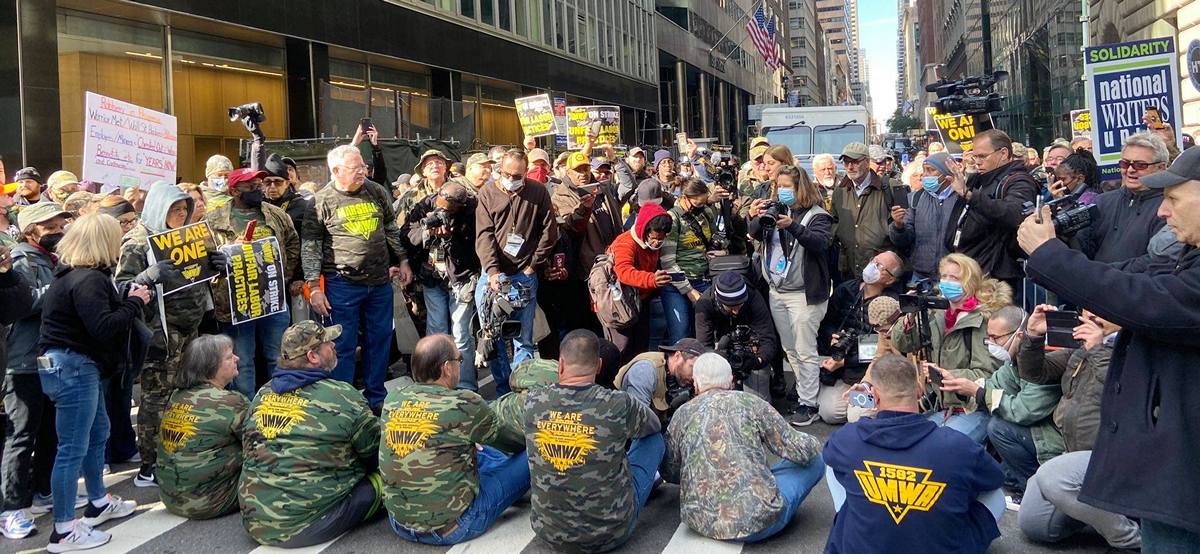
Striking Alabama coal miners travel to Blackrock headquarters in New York City,
November 4, 2021.
• Two Offers Voted Down: John Deere Workers Reject Three Tiers and Attacks on Pensions
• Coal Miners Continue Their Months-Long Strike
• Metal Workers in West Virginia and Ohio Strike, Refusing Company Concessions
• Thousands of Health Care Workers Strike Demanding Safe Working Conditions
• Teachers Strike in Scranton Demands Conditions Necessary for Teaching
and Learning
• Food Processing Workers Oppose Attacks on Working Conditions
United States
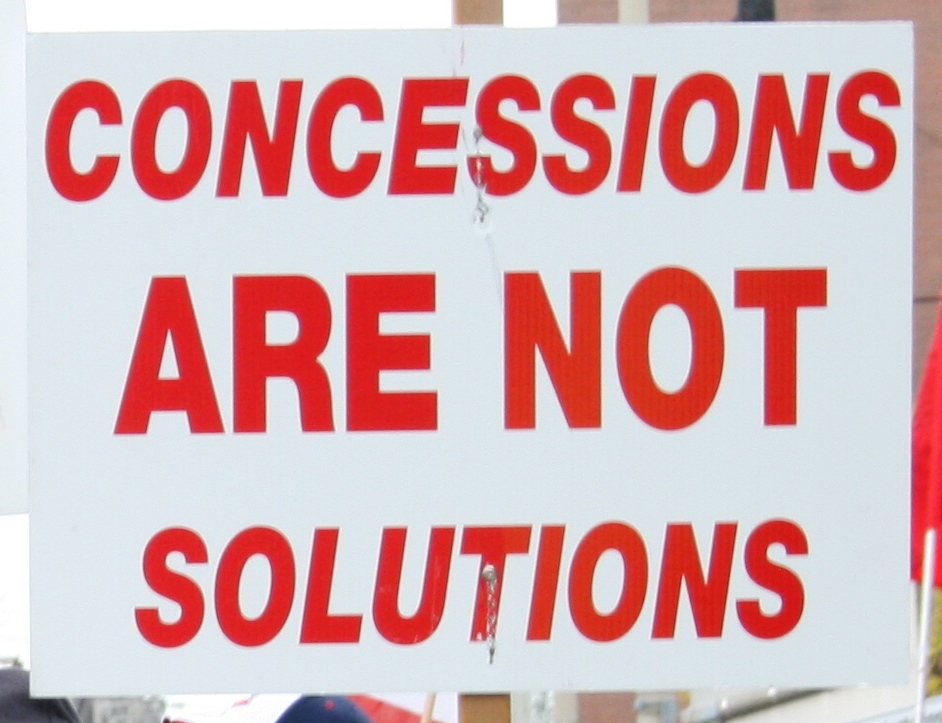 Across the U.S., workers in many industries and
services are striking to defend their rights and the rights of those
they serve. They are rejecting demands for yet more concessions and
affirming their experience that Concessions Are Not Solutions! Many are
standing against two-tier systems that attack younger workers,
often greatly lowering wages and eliminating pensions and healthcare
benefits secured through determined struggles by existing and
retired workers. John Deere workers, miners, teachers, health care, food
and other workers are taking their stand, rejecting the anti-social attacks of
the giant oligopolies. Across the U.S., workers in many industries and
services are striking to defend their rights and the rights of those
they serve. They are rejecting demands for yet more concessions and
affirming their experience that Concessions Are Not Solutions! Many are
standing against two-tier systems that attack younger workers,
often greatly lowering wages and eliminating pensions and healthcare
benefits secured through determined struggles by existing and
retired workers. John Deere workers, miners, teachers, health care, food
and other workers are taking their stand, rejecting the anti-social attacks of
the giant oligopolies.
In
many ways they are expressing the need for a new direction for the
economy that provides for rights, including safe conditions for all,
wages, benefits and pensions acceptable to the workers themselves.
These belong to workers by right and as the producers, workers are not
a cost, as the oligopolies claim, but the creators of wealth. Workers
along with those they serve, are standing up for rights in a situation
where the oligopolies persist in their anti-social offensive.
We applaud all these efforts and stand as one with all those engaged
in these battles. Below are summaries of some of these battles. Workers
at scores of smaller facilities have been or are still on strike.
For a complete list of all current and recent worker strikes in the United States, click here. To send messages of support or to contribute materially in some way, contact the union locals on
strike.

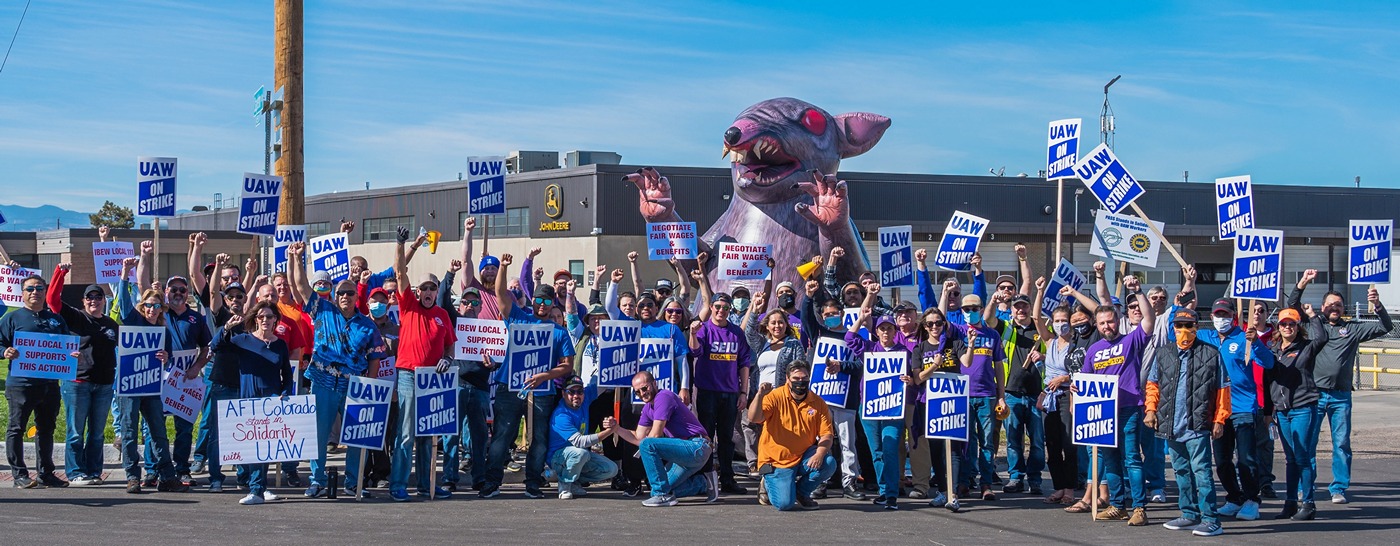 Picket line at John Deere plant in Denver, CO, October 22, 2021. Picket line at John Deere plant in Denver, CO, October 22, 2021.
The United Auto Workers (UAW) issued a
statement on November 12, headlined "Strike continues through
ratification vote," that informed John Deere has made "a last, best and
final offer to the UAW negotiating team," which will be presented to
the members for ratification. Workers at John Deere have been on strike
since October 14 and have voted down two company offers. The strike
involves about 10,000 workers in 13 locations in Colorado, Georgia,
Illinois, Iowa and Kansas. It is the first strike in 35 years against
the world's largest agricultural and construction equipment company.
More than 90 per cent of UAW members at Deere rejected the first
contract presented to them.
The locals on strike are:
Local 74, Ottumwa, Iowa (John Deere Ottumwa Works)
Local 94, Dubuque, Iowa (John Deere)
Local 186, Denver, Colorado (John Deere)
Local 434, Moline, Illinois (John Deere)
Local 450, Des Moines, Iowa (John Deere Des Moines Works)
Local 472, Covington, Georgia (John Deere)
Local
2366, Coffeyville,
Kansas (John Deere Coffeyville Works)
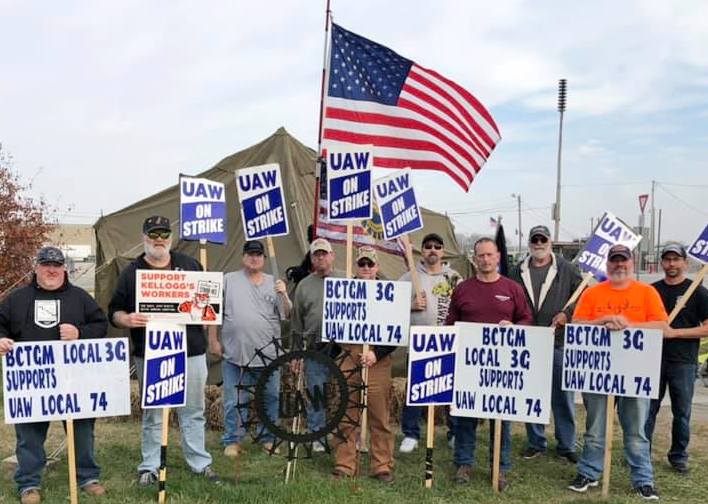 Since
going on strike, members have been maintaining 24/7 picket lines.
Locals have printed shirts that read "Deemed Essential in 2020. Prove
It in 2021. Can't Build It From Home." On October 18, several locals
made a push for large morning pickets. In Waterloo, Iowa, members
reported a three-hour backup of salaried workers and
management employees attempting to cross the line; in Davenport, two
and a half hours. A mass "show of force" by Local 865 at Deere's
Harvester Works in East Moline, Illinois, drew 1,000 picketers and
stretched for 15 blocks. Workers have persisted with similar tactics. Since
going on strike, members have been maintaining 24/7 picket lines.
Locals have printed shirts that read "Deemed Essential in 2020. Prove
It in 2021. Can't Build It From Home." On October 18, several locals
made a push for large morning pickets. In Waterloo, Iowa, members
reported a three-hour backup of salaried workers and
management employees attempting to cross the line; in Davenport, two
and a half hours. A mass "show of force" by Local 865 at Deere's
Harvester Works in East Moline, Illinois, drew 1,000 picketers and
stretched for 15 blocks. Workers have persisted with similar tactics.
They have also received overwhelming support from their communities as well as farmworkers and many others.
Workers are insisting on eliminating a two-tier system put in place
back in 1997. Conditions, wages and benefits are so different that
workers refer to pre- and post-1997. Those hired since 1997 are paid
substantially less and have no retiree health benefits. Now, Deere
wants a third tier with future workers facing these same cuts and
ineligible
for pensions.
Like other monopolies, Deere is offering wage increases that are
actually cuts, as they do not keep up with the current five per cent
inflation rate. The tentative six-year agreement voted down included a
five per cent raise in year one. In 2022, 2024, and 2026, workers would
receive two per cent lump sums instead of wage increases, a method
to further lower wages and sums far below inflation. Effectively the
increase in actual wages is only five per cent.
As a Milan, Illinois union representative put it, "In 1997, Deere
reported a net income of $817 million. In 2021, they are projected to
make $5.7 billion." Meanwhile, the starting wage at Deere has gone from
just under $15 in 1997 to just over $20 in the current offer. "While
Deere profit has grown almost 700 per cent since 1997, our buying
power has shrunk by 35 per cent."
Although Deere workers are considered "critically essential" because
they manufacture farm equipment, their rights are being brutally
attacked. Deere has also proposed ending the plant closure moratorium,
doing away with overtime pay after eight hours, eliminating
seniority-based wage progressions, forcing workers to pay 20 per cent
of their
health insurance premiums, and many other draconian concessions. While
the strike has forced Deere to back down on some of these, their demand
for three tiers, low wages and more persists.
The company has also sought court injunctions to block picket lines
and other union activity. In one case they secured the injunction, in
another they did not. One judge denied Deere's request to restrict
picketing of its Des Moines Works in Ankeny, Iowa, saying that despite
hours of security video, Deere had failed to prove its contention that
UAW members have frequently engaged in unlawful activity. In the other
a judge granted a temporary injunction against strikers who trespass on
the company's Davenport Works facility or block its entrance and exits.
He limited the number of picketers to no more than four at each gate of
the facility.
Workers remain undaunted and have persisted in their struggle,
manning the picket lines 24/7. They are determined to defeat both the
two- and three-tier systems and to secure wages and working conditions
acceptable to themselves. 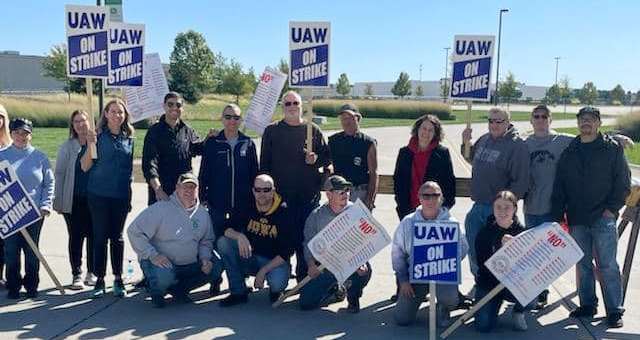
Striking John Deere workers in Des Moines, IA, October 18, 2021

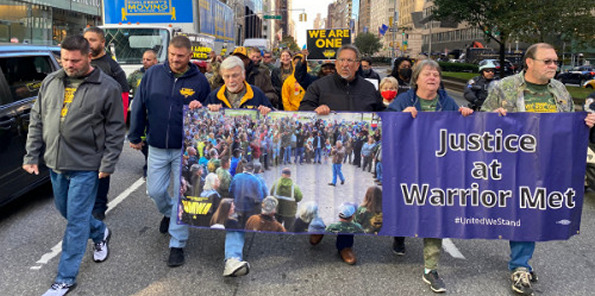
Coalminers march in New York City, November 4, 2021.
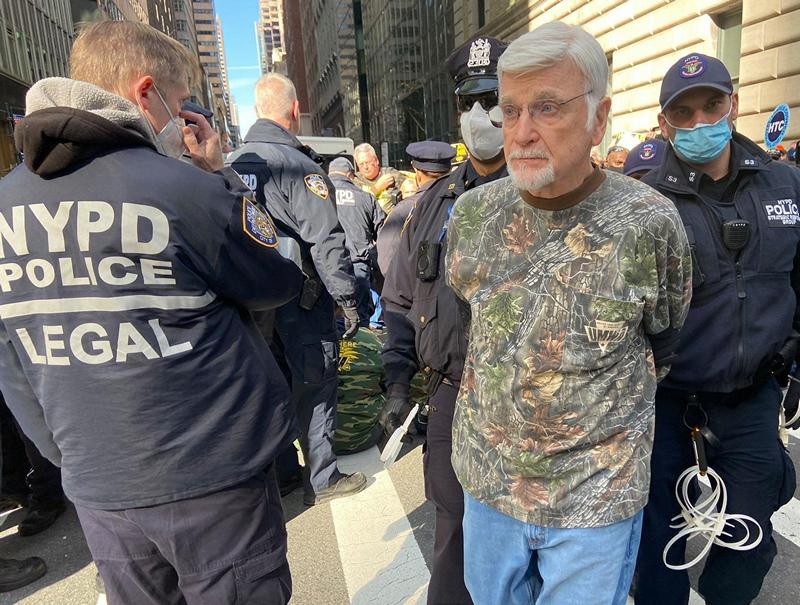 Alabama coal miners have been on strike
against Warrior Met since April 1 and continue their fight. They have
already voted down one contract offer. The 1,100 workers persist in
manning picket lines and again travelled to New York City to
confront BlackRock, which has a controlling interest in Warrior Met. BlackRock
is one of the world's largest financiers, responsible for closing many
facilities and making a quick score while massively eliminating jobs
and attacking wages and working conditions. Alabama coal miners have been on strike
against Warrior Met since April 1 and continue their fight. They have
already voted down one contract offer. The 1,100 workers persist in
manning picket lines and again travelled to New York City to
confront BlackRock, which has a controlling interest in Warrior Met. BlackRock
is one of the world's largest financiers, responsible for closing many
facilities and making a quick score while massively eliminating jobs
and attacking wages and working conditions.
On
November 4, workers protested at BlackRock headquarters. Five people
were arrested during the action, which followed similar protests in June
and July. In addition Warrior Met secured a restraining order against
picket line activity by the United Mine Workers of America (UMWA) at
their sites. They claimed violence at the picket lines
had "reached a dangerous level," in a situation where it is the company which has
been violent.
The order prohibits virtually any activity that disrupts the
company's operations, including "picketing or other activity within 300
hundred yards of any entrances of the premises," and interfering
with "the conduct and operation of Warrior's business and supporting
activities, including mass picketing." It effectively enables the
company to
bring in as much scab labour as possible, while trying to force the
strikers into submission.
 The temporary restraining order is the latest in a series of
provocations by the company against the ongoing strike. For weeks, the
company has conducted a smear campaign by ratcheting up provocations.
This includes hiring a PR firm, Sitker and Company, to paint the
strikers as "violent" in the news and on social media. On a
company-sponsored YouTube page, a surveillance video was posted which
claims to show picketers "attacking" a scab. In fact, it shows a
vehicle running directly into miners on the picket line. Throughout the
strike, multiple picketers and their wives have been struck by
vehicles, with at least one miner hospitalized for his injuries. As one
miner
put it, "Miners have been shot at late at night. The cops don't care
about the miners and do little when they call in a shooting or
vehicular assault, which have continued to occur. Meanwhile, the cops
escort the bus with the scabs every day." The temporary restraining order is the latest in a series of
provocations by the company against the ongoing strike. For weeks, the
company has conducted a smear campaign by ratcheting up provocations.
This includes hiring a PR firm, Sitker and Company, to paint the
strikers as "violent" in the news and on social media. On a
company-sponsored YouTube page, a surveillance video was posted which
claims to show picketers "attacking" a scab. In fact, it shows a
vehicle running directly into miners on the picket line. Throughout the
strike, multiple picketers and their wives have been struck by
vehicles, with at least one miner hospitalized for his injuries. As one
miner
put it, "Miners have been shot at late at night. The cops don't care
about the miners and do little when they call in a shooting or
vehicular assault, which have continued to occur. Meanwhile, the cops
escort the bus with the scabs every day."
The current agreement with the union was negotiated as Warrior Met
emerged from the bankruptcy proceedings of the former Walter Energy,
which declared bankruptcy in 2016. As many workers in the U.S. and
Canada have experienced, bankruptcy is legalized theft. It is used to
secure massive profits while also attacking workers. The coal
miners were forced to make numerous concessions in pay, benefits,
holidays, overtime and other areas. They are demanding that all be
restored and that wages and safety be improved. Like other strikers,
they have received widespread support.
For further details see "Mass Workers' Rally at BlackRock's New York Headquarters; Striking Alabama Coal Miners Adopt Bold Slogan We Are One!," TML Monthly August 2021 .

Four hundred and fifty workers at Special Metals Corporation, a
nickel alloy plant in Huntington, West Virginia have been on strike
since October 1. The members of USW Local 40 rejected a company demand
for wage cuts, an increase in private health insurance premiums and
other concessions on working conditions. The workers produce
high-temperature-resistant "superalloys" used in military and civilian
aircraft, missiles, deep sea drilling rigs and space-related equipment.
Special Metals operates as a subsidiary of Oregon-based Precision
Castparts within the global investment cartel controlled by oligarch
Warren Buffett's Berkshire Hathaway.
ArcelorMittal Tubular Products Workers Achieve Improvements
Five hundred steelworkers who had been on strike since November 1
at ArcelorMittal Tubular Products plant in Shelby, Ohio approved a new
contract on November 11. The members of USW Local 3057 launched their
strike to defend their rights and claim on the value they produce. Of
particular concern were issues related to health care,
pensions and the length of the working day and week. Brian Sealy, USW
District 1 representative, told the Mansfield News Journal, "It is a
four-year agreement (that) guaranteed time off, reduction in health
care premiums, good increases in wages each year and increases to
pension each year." 
Mercy Hospital Nurses Secure Improved Staffing and Conditions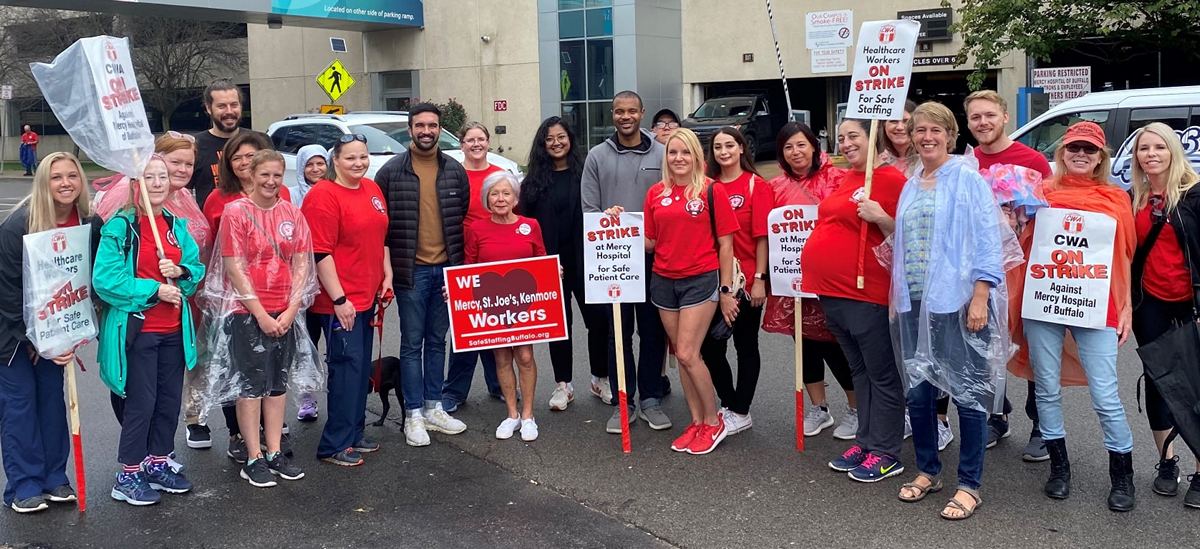
Workers
at Mercy Hospital in Buffalo, New York were on strike 35 days, starting
October 1, demanding safe staffing and working conditions and increased
wages. They joined several hundred nurses in Worcester, Massachusetts,
who have been on strike at St. Vincent Hospital since March 8 and over
900 maintenance and service workers at Cabell Huntington Hospital in
West Virginia who struck on November 3. Like many health care workers,
all have been forced to work in unsafe conditions, especially where
staffing is concerned. As nurses across the country are bringing out,
there is not a shortage of nurses but a shortage of safe working
conditions. The difficult work they do has become more so during the
pandemic. Many across the country still contend with a lack of
protective gear, testing, paid sick days for quarantining and more.
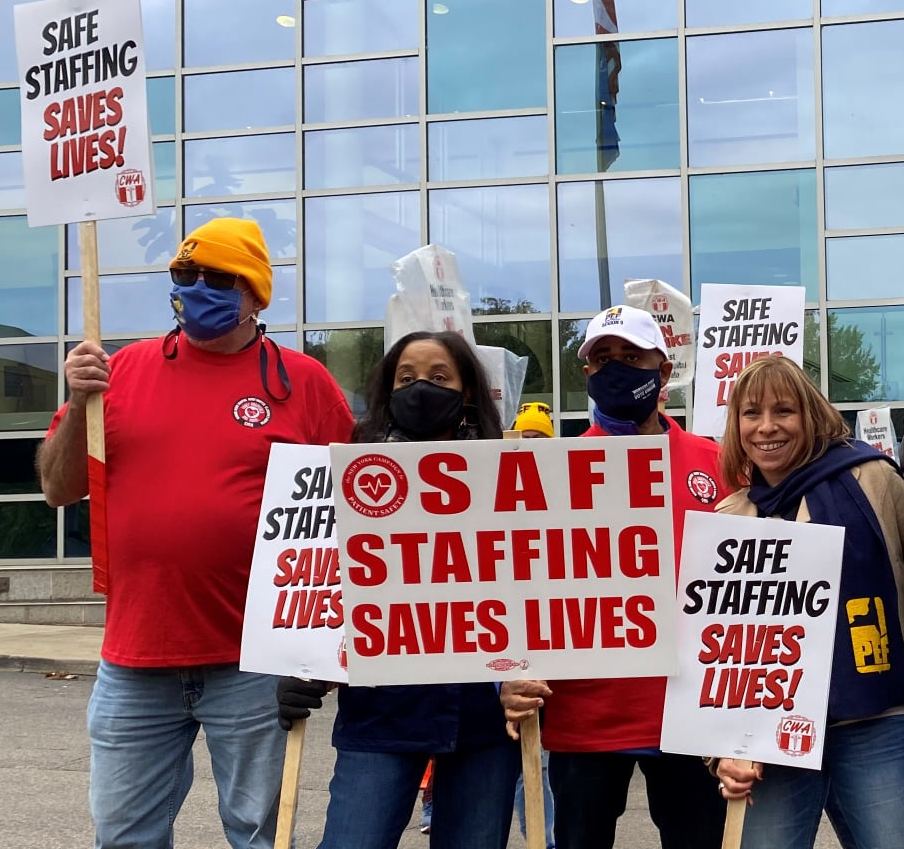 The
strike at Mercy Hospital involved about 2,500 nurses and clerical,
service and technical staff, and the demand for a staffing ratio of one
nurse per four patients in the medical-surgical areas, the minimum
needed. As well, many of the staff had poverty level wages, including
environmental service workers and dietary aides, who made as little as
$13.45 an hour. These workers contend directly with COVID-19 yet are
making less than those at McDonald's and similar fast food locations. The
strike at Mercy Hospital involved about 2,500 nurses and clerical,
service and technical staff, and the demand for a staffing ratio of one
nurse per four patients in the medical-surgical areas, the minimum
needed. As well, many of the staff had poverty level wages, including
environmental service workers and dietary aides, who made as little as
$13.45 an hour. These workers contend directly with COVID-19 yet are
making less than those at McDonald's and similar fast food locations.
The striking workers at Mercy Hospital are all members of the
Communications Workers of America (CWA) Locals 1133 and 1168. The
workforce, largely women, joined in staffing the picket lines and
received the support of patients and community members who appreciate
their tremendous efforts to provide care and demand patient safety.
While Catholic Health had been claiming it cannot afford increased
wages, they were paying scabs $150 an hour to fill nursing positions,
more than triple current wages of the strikers, and spending tens of
millions of dollars to keep the hospital open. On November 1, Catholic
Health also stopped paying health care benefits as a means of
blackmailing nurses and staff back to work.
A tentative agreement affecting Mercy Hospital and other Catholic
Health Hospitals was reached November 4 and was overwhelmingly ratified
at meetings November 6-7. According to CWA it provides for guaranteed
staffing ratios that will mean Mercy has to hire about 400 people.
"Thanks to the steadfast determination and sacrifices of our members
over the past five weeks, these Catholic Health hospitals are now the
first in New York, and some of the only across the country that will
guarantee safe staffing levels," said CWA Area Director Debora Hayes.
Cabell Huntington Hospital
The striking health care workers at Cabell Huntington Hospital are
members of Service Employees International Union (SEIU) District 1199.
The licensed practical nurses, lab
technicians, maintenance and cleaning staff rejected a proposed
contract that drastically hikes private health insurance premiums and
lowers take-home pay. Needless to say, the workers have been under
tremendous stress during the pandemic health emergency with West
Virginia recently suffering a particularly severe outbreak of the Delta
COVID-19 outbreak. St. Vincent Hospital
The strike at St. Vincent Hospital continues. The corporate
owner of the hospital, Tenet Health announced $448 million in profits
for the third quarter, which are said to be in part driven by increased
emergency room admissions and surgical procedures.
Kaiser Permanente
Striking facility and biomedical engineers at the Vallejo facilities
of Kaiser Permanente will be joined on the picket line across northern
California on November 19 by 2,000 mental health clinicians,
psychologists, therapists and social workers. The workers report they
will stand with their already striking coworkers and demand "Kaiser
bargain in good faith to fix its broken mental health care system that
leaves patients waiting up to three months for therapy appointments and
therapists overwhelmed with crushing caseloads."
Pickets will be set up outside Kaiser Hospitals in Vallejo, San
Francisco, Sacramento, Fresno, Santa Rosa, Oakland and San Jose
starting 6 am on November 19. The mass action is in solidarity with
members of the Stationary Engineers Local 39, who have been striking
Kaiser Facilities in Northern California since September 18.
"Every time we've gone on strike to demand better care for our
patients, the engineers have joined us on the picket line," said Willow
Thorsen, a Kaiser social worker in Santa Rosa in a news release. "We're
striking now to stand up for our colleagues and our patients, who are
being denied the care they need."
Kaiser mental health clinicians, represented by the National Union
of Healthcare Workers (NUHW), have been without a contract since
October 1. The Kaiser giant has rejected union proposals to increase
staffing, recruit more bilingual and minority therapists and ease
unsustainable caseloads that are causing increased turnover at Kaiser
Clinics.
"Kaiser is in denial about how much its patients are suffering
trying to access mental health care," said Kenneth Rogers, a Kaiser
psychologist in Sacramento. "There's no clinical standard that calls
for making patients wait a month or more between appointments, and
therapists are leaving because we can't provide ethical care."
To increase pressure on Kaiser to reach a settlement that meets
their rights and claims, the NUHW has issued another strike notice
affecting Kaiser Outpatient pharmacies to last from November 15 through
November 22.
A union survey of Kaiser mental health clinicians released earlier this year found that:
"80 per cent reported that their clinics are too understaffed to provide appropriate and timely care to patients.
"65 per cent reported that every day they must schedule return
appointments further into the future than is clinically appropriate for
their patients.
"87 per cent reported that weekly individual psychotherapy appointments are unavailable for patients who need it.
"55 per cent reported that during the past six months they've considered leaving Kaiser."
Sal Rosselli, President of the National Union of Healthcare Workers,
which represents Kaiser mental health clinicians in California and
Hawaii said, "Kaiser's refusal to even consider proposals to boost
staffing and improve care shows that it's not serious about working
with clinicians to fix its mental health care system."
Kaiser Permanente operates 39 hospitals and more than 700 medical
offices, with over 300,000 personnel, including more than 80,000
physicians and nurses. According to the NUHW, the most recent annual
financial accounts from Kaiser report a $13.8 billion profit and liquid
cash reserves totalling $44 billion.
32,000 California Health Care Workers Planned Strike Averted
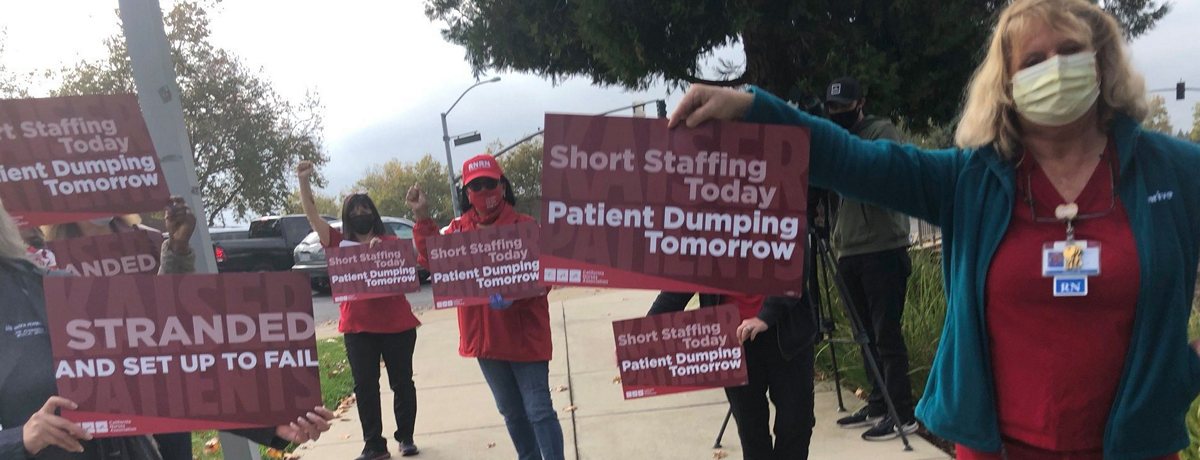
Unions
representing thousands of Kaiser Permanente workers, who had planned to
strike November 15, announced on November 13 that a tentative agreement
had been reached. The United Nurses Associations of California/Union of
Health Care Professionals had planned to strike over Kaiser's demands
to further "depress wages for current employees and slash wages for
incoming workers during a national health care staffing crisis," the
union said. The health care workers -- about 21,000 registered nurses,
pharmacists, midwives, physical and occupational therapists, nurse
practitioners and physician assistants -- are part of the Alliance of
Healthcare Unions, with 21 locals representing 52,000 workers.
The two-tier system Kaiser wants to create of regional wage scales
for everyone hired after 2022, meaning a giant cut in pay and benefits,
did not make it into the tentative agreement. Two-tier systems are
unusual in health care and workers recognize this as a major threat to
all, especially given Kaiser is seen as a leading force in the
industry. As one worker put it, "Two-tier finds a crack and creates a
canyon."
The proposal would also put some new hires behind current starting
rates at McDonald's or Amazon warehouses. "If given a choice between
flipping burgers or moving COVID patients to the morgue for the same
money, it's a no-brainer," said one long-time mobility technician. Nationwide Opposition to "Home All
Alone" Care Model
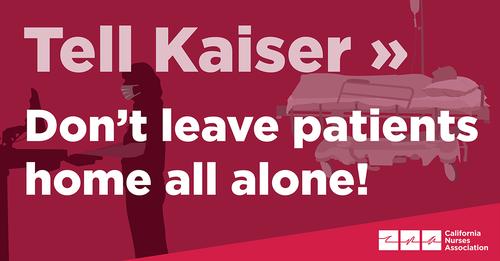 In
addition, nurses statewide are organizing to block efforts by Kaiser to
put in place a "stay at home" model for health care. Spearheaded by
National Nurses United (NNU), health care workers are organizing to
prevent Kaiser, along with the Mayo Clinic and Medically Home to impose
what the nurses call "Home All Alone." As their call-out states,
"Imagine you show up acutely ill in the emergency room and the medical
staff agree you need to be hospitalized immediately -- but instead of
admitting you, you get sent home with an iPad, a monitor, and the
promise of "virtual care." No hands-on care, no 24/7 registered nurses
and other providers to watch for those slight telltale changes in your
condition, no one to hold your hand or calm your fears." It destroys
the expectation and availability of safe, professional nursing care in
a hospital setting. In
addition, nurses statewide are organizing to block efforts by Kaiser to
put in place a "stay at home" model for health care. Spearheaded by
National Nurses United (NNU), health care workers are organizing to
prevent Kaiser, along with the Mayo Clinic and Medically Home to impose
what the nurses call "Home All Alone." As their call-out states,
"Imagine you show up acutely ill in the emergency room and the medical
staff agree you need to be hospitalized immediately -- but instead of
admitting you, you get sent home with an iPad, a monitor, and the
promise of "virtual care." No hands-on care, no 24/7 registered nurses
and other providers to watch for those slight telltale changes in your
condition, no one to hold your hand or calm your fears." It destroys
the expectation and availability of safe, professional nursing care in
a hospital setting.
This venture, already being tested in two hospitals, will allow
Kaiser to close hospital beds, outsource work, cut wages,
eliminate nurses and other staff, while still getting reimbursed by
insurers and Medicare -- all at the expense of patients and safe
patient care. The plan is dangerous and life-threatening on many levels
and shifts the burden of care onto untrained family members, most often
women already contending with childcare, elder care and more.
NNU celebrated the one-year anniversary of its National Advocacy
Network, which brings together health care workers and people from all
walks of life to join in organizing to defend the rights of health care
workers, patients and their communities.
They state: We are united with Kaiser nurses, our community allies, and patients in our demands for increased staffing and that:
- Kaiser must immediately end all "Home All Alone" contracts with groups like Medically Home.
- Kaiser must end outsourcing contracts that jeopardize patient safety and violate the nurses' contract.
- Kaiser must hire additional direct care nurses to staff according to patient acuity.
-
Nursing clinical judgment must be the cornerstone of patient care, not biased technologies and algorithms.

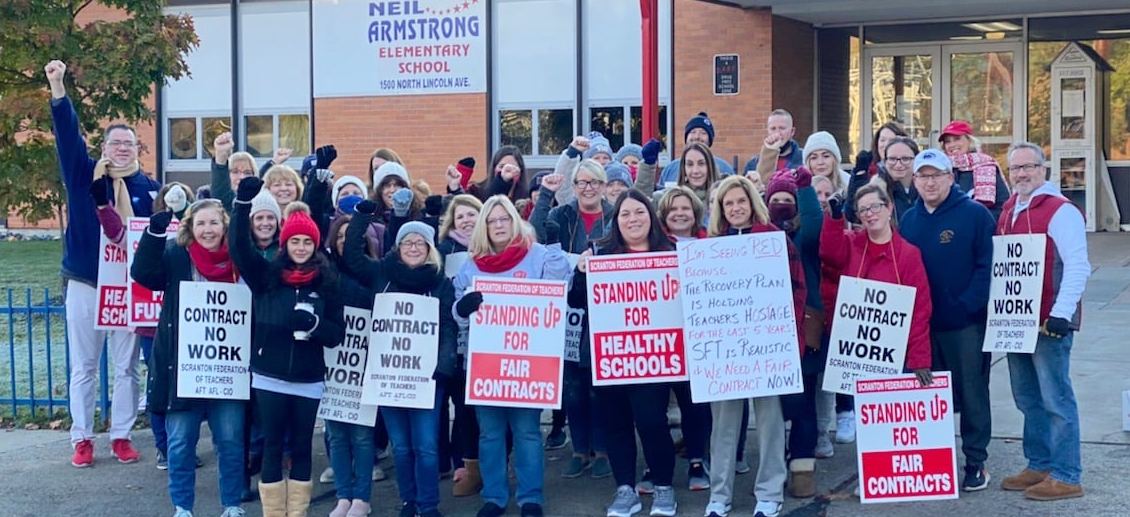
Teachers in Scranton, Pennsylvania, President Joe Biden's hometown,
went on strike November 3. About 900-strong, the teachers and staff
joined picket lines at schools in one of the largest districts in the
area, where 82 per cent of families are impoverished.
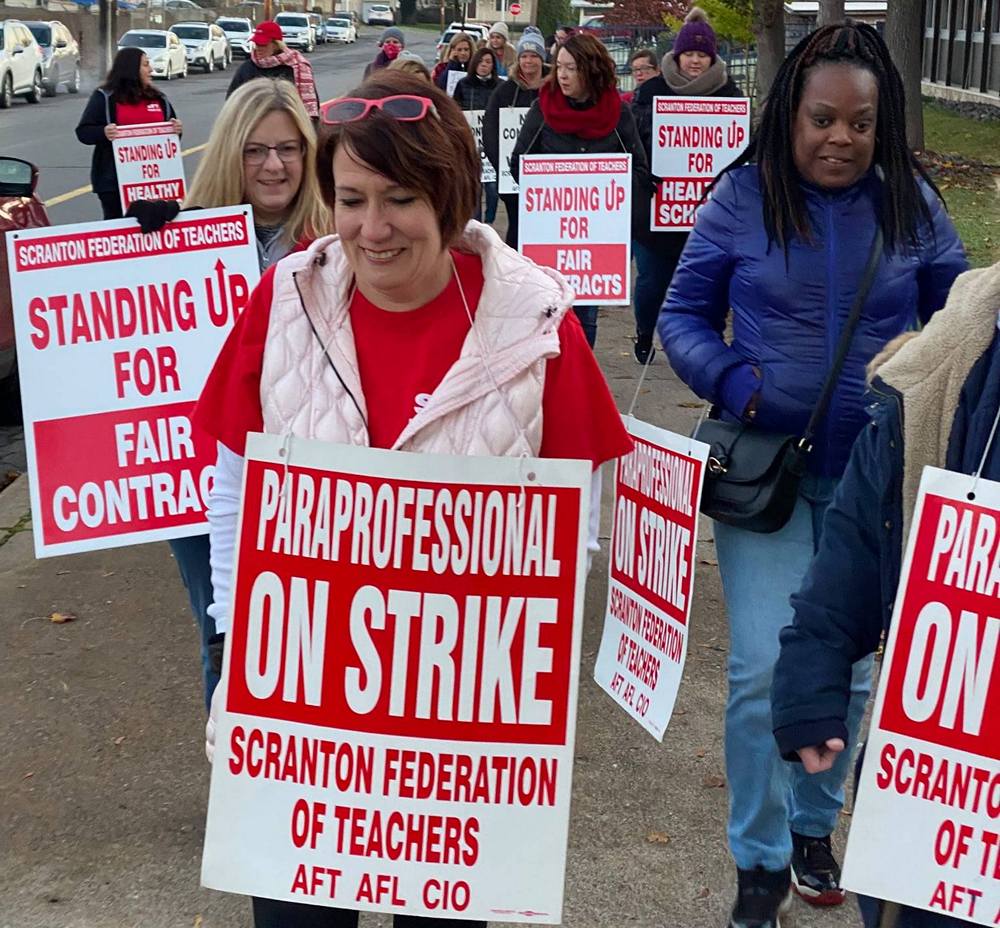 On
Monday, November 1, about 400 of the teachers and staff, most of them
women, attended a school board meeting calling for increased funding
and rejecting the board's demands for larger class sizes and longer
school days, and attacks on health care benefits. Despite receiving
close to $60 million in federal pandemic relief funds, the
school board claims they cannot increase wages without major cuts to
health care. At the meeting, the board said they would completely cut
the health care benefits of anyone who went on strike. The 400 teachers
and staff in attendance rose in unison, singing "Solidarity Forever" as
they marched out, and they hit the picket lines Wednesday
morning. Their red T-shirts express their fight: "Standing Up for
Public Education." On
Monday, November 1, about 400 of the teachers and staff, most of them
women, attended a school board meeting calling for increased funding
and rejecting the board's demands for larger class sizes and longer
school days, and attacks on health care benefits. Despite receiving
close to $60 million in federal pandemic relief funds, the
school board claims they cannot increase wages without major cuts to
health care. At the meeting, the board said they would completely cut
the health care benefits of anyone who went on strike. The 400 teachers
and staff in attendance rose in unison, singing "Solidarity Forever" as
they marched out, and they hit the picket lines Wednesday
morning. Their red T-shirts express their fight: "Standing Up for
Public Education."
Teachers and staff have been without a contract since 2017, meaning
no raises, no "step" wage increases based on seniority, and no increase
in benefits. At the school board meeting dozens of people spoke about
the devastating cuts that students and teachers have endured over the
last four years. These include anti-educational cuts like those to
the arts, music, libraries and pre-kindergarten education. The school
district has already lost 100 people due to cuts and those exhausted
from having to teach in unsafe and worsening conditions for themselves
and their students.
Teachers and staff have been attending school board meetings for
months and consistently working with parents, including holding
informational picket lines. They report that the community is strongly
behind the striking teachers. Many motorists are honking support at
picketers, businesses are feeding them, parents are joining them, and
three
union-endorsed candidates won school board seats November 2, on the eve
of the strike.
Rosemary Boland, president of the Scranton Federation of Teachers
emphasized, "The administration has to take responsibility for their
actions and correct their actions to protect the health, safety, and
wellness of every child in our school." 
On Strike Since October 5 Kellogg Workers Persist in
Saying No to Concessions
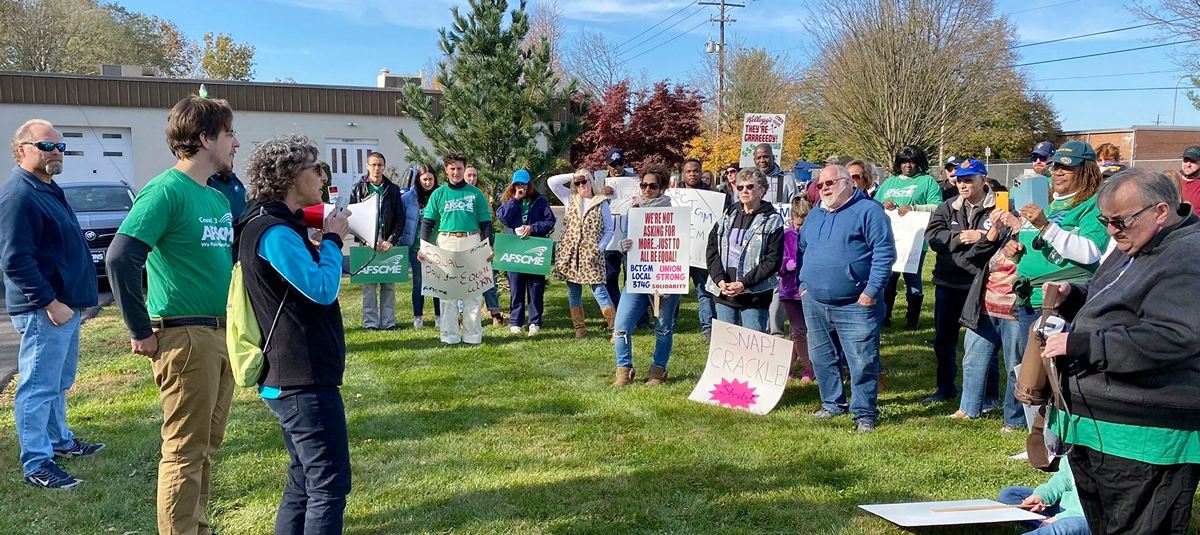
Striking Kellogg's workers in Lancaster, PA, November 8, 2021.
Kellogg workers remain on the picket line,
demanding an end to a
two-tier wage system imposed in 2015 that forces many to work for much
lower pay and few benefits. Some 1,400 workers walked off the job
October 5 in Battle Creek, Michigan; Lancaster, Pennsylvania; Memphis,
Tennessee; and Omaha, Nebraska. The workers have gotten
broad support, including a rally of hundreds October 27 at Kellogg
headquarters in Battle Creek. Workers at Kellogg, like Nabisco and Frito-Lay whose
workers also struck this year, are part of the Bakery Confectionery
Tobacco Workers and Grain Millers (BCTGM) union. Though relatively
small (about 65,000 in total) the union has now organized strikes
involving thousands against three major monopolies, all involving
forced overtime and two-tier wage and benefit structures. Kellogg is
currently demanding further cuts to health care benefits, pensions,
holiday and vacation pay, cost of living raises and union jobs. The
company also wants to eliminate pensions for all future workers.
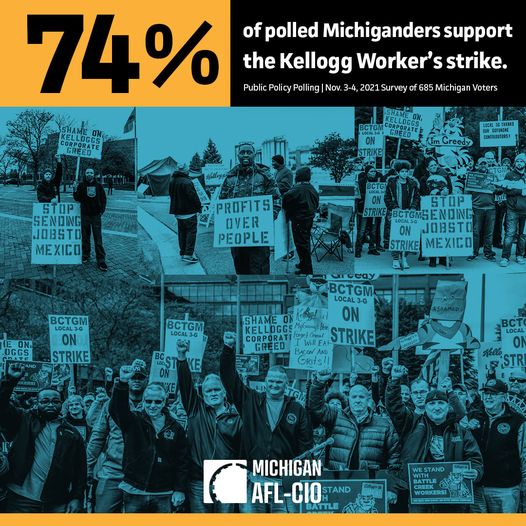 In
2015, the company threatened to close one of its four plants and
then imposed a two-tier system, where 30 per cent of the workforce was
considered "transitional" while the remaining 70 percent were
designated as regular, full-time employees. "Transitional" workers make
roughly $12 less per hour than other full-time employees, with higher
insurance premiums, less vacation time, and no retirement benefits. In
accepting the concession, workers thought they would transition to
regular status but this has not occurred. Now they are striking to
demand elimination of the two-tier system and defend pensions for all. In
2015, the company threatened to close one of its four plants and
then imposed a two-tier system, where 30 per cent of the workforce was
considered "transitional" while the remaining 70 percent were
designated as regular, full-time employees. "Transitional" workers make
roughly $12 less per hour than other full-time employees, with higher
insurance premiums, less vacation time, and no retirement benefits. In
accepting the concession, workers thought they would transition to
regular status but this has not occurred. Now they are striking to
demand elimination of the two-tier system and defend pensions for all.
In addition all the workers have regularly been pushed to work
twelve-to-sixteen-hour days, seven days a week, with no holidays or
vacation time. The pandemic has brought even greater demands for
increased production of cereals like Corn Flakes, Rice Krispies,
Frosted Flakes, and Froot Loops.
With the current strike, workers are rejecting demands by Kellogg to
force younger and newer workers doing the same work into worse
conditions -- something many of the monopolies are imposing. The tiers
are a means to divide workers and weaken the union but workers are
refusing more concessions and taking their stand. As one worker
put it, "We are out here fighting against the two-wage system and for
the next generation of workers to have the same pay and benefits."
Nabisco Workers Strike: 'There's More of Us Than There Are of Them'
Nabisco workers were on strike for a month in August and like many
workers faced threats of closure and cuts to healthcare. Already two
plants were moved to Mexico and two closed earlier this year in Fair
Lawn, New Jersey, and Atlanta, Georgia. In the just settled set of
negotiations, Nabisco was demanding a two-tier health care plan and
putting workers on three 12-hour shifts, including for weekends, with
no overtime pay (which is currently time-and-a-half on Saturday and
double-time on Sunday). The workers refused. Nabisco immediately cut
off their healthcare, now a common tactic against strikers. But the
workers stood firm. They were able to block the two-tier healthcare
plan and keep overtime pay and existing work schedules for current
workers. As well employer contributions to workers' 401(k) plans (a
retirement savings vehicle) will be doubled. Nabisco will however be
able to schedule three 12-hours shifts on weekends which new workers
will be required to work without overtime pay.
The demand for 12-hour shifts with no overtime was a key issue,
especially given that most are forced into overtime now. For many it
would mean a cut of $20,000 yearly in overtime pay. As well, given
existing experience, many knew 12 hours would become 16. While some
workers were angry about the attack on new hires and voted no,
seeing this attack as a stepping stone toward eliminating gains like
overtime pay for all workers, the contract was ratified.
The strike started in Portland, Oregon, on August 10 and spread to
Nabisco's two other U.S. bakeries in Richmond, Virginia, and Chicago,
Illinois as well as distribution centers in Aurora, Colorado, and
Norcross, Georgia. Workers make Oreos, Chips Ahoy, Ritz crackers, and
Saltines, among other products.
Strikers joined with local organizations and unions to strengthen
their efforts. In Portland, local organizations held weekly rallies on
Saturday, which drew hundreds of supporters. "Boycott brigades" headed
out afterward to leaflet and plaster supermarkets with stickers reading
"Don't Buy Nabisco! Respect the Strike!" Members of the Portland
Thorns, the women's professional soccer team, joined the picket line,
as did Teamsters, nurses, carpenters, and fellow grocery workers from
out of state.
Supporters organized a visit in the middle of the night to a local
Marriott to demand it stop housing scabs, honking horns and setting off
car alarms to drive their point home. Portland activists, many from
recent battles against police killings and violence, blocked vans full
of scabs from getting to or leaving the plant. They also stood on the
railroad tracks with picket signs, convincing a union engineer to
reverse a train carrying ingredients to the plant. Many people joined
in raising $91,000 in an online strike fund.
Regardless of how they voted on the contract, workers were inspired
by the support they got and pledged to join rallies by other workers
fighting for their rights. "There's more of us than there are of them,"
was the spirit of many.
Frito-Lay Workers Strike to End 84-Hour Workweeks
Frito-Lay workers in Topeka, Kansas, went on strike for 19 days in
July to end forced overtime and 84-hour workweeks of 12 hours a day,
seven days a week. The new two-year contract guarantees at least one day
off per week. While it raises wages four per cent over two years, this
remains insufficient to meet the current rates of inflation of five
per cent yearly.
Workers at the Topeka plant were demanding an end to a situation
where they were working double and triple shifts and voted down the
first contract offer. Many were working exhausting 12-hour shifts in
stifling hot conditions with as little as eight hours in between. As
frontline workers, they are not receiving hazard pay during the
pandemic. They are speaking out about safety concerns, including the
long hours and walked out in part for those reasons.
Frito-Lay, the maker of Cheetos, Doritos, Ruffles and other packaged
foods, is a unit of PepsiCo, the New York-based food and beverage
oligopoly. Workers produced $4.5 billion in revenue in just the second
quarter, accounting for 23 per cent of PepsiCo's revenue.

(To access articles individually click on the black headline.)
PDF
PREVIOUS
ISSUES | HOME
Website: www.cpcml.ca
Email: office@cpcml.ca
|

